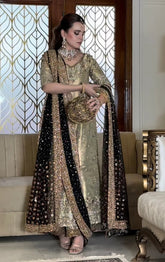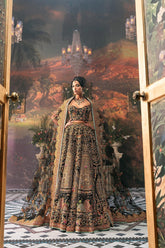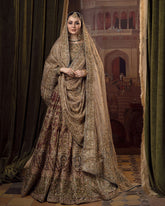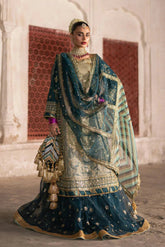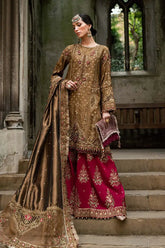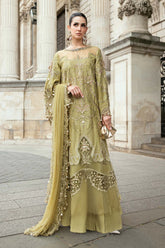Seasonal Fashion in Pakistan: How to Dress for Each Season
Pakistan is a country of diverse climates, with distinct seasons that vary from region to region. From the scorching heat of summer to the frosty winters in the north, each season brings its own fashion challenges and opportunities. Dressing appropriately while maintaining style is key in a country where traditional and modern fashion seamlessly blend. In this blog post, we’ll explore how to dress for each season in Pakistan, keeping comfort and style in mind.
-
Spring: A Fresh Start to the Year
Spring in Pakistan, typically from March to May, brings mild temperatures and blooming flowers, making it an ideal season for colorful and vibrant outfits. The weather during this time is pleasant, neither too hot nor too cold, so it’s the perfect opportunity to experiment with lightweight fabrics and pastel hues. Designers like Hussain Rehar often showcase collections that embrace the freshness of the season.
What to Wear in Spring:
- Lawn Suits: Spring marks the arrival of lawn fabric collections from designers across the country. Light and breathable, lawn suits are a must-have. Opt for floral prints, pastel colors, and minimal embroidery to reflect the freshness of the season.
- Cotton Kurtas: For casual wear, cotton kurtas are comfortable and chic. Pair them with straight pants or trousers for an effortless yet trendy look.
- Chiffon Dupattas: Chiffon dupattas add a touch of elegance to any outfit without being too heavy. Choose bright colors to add contrast to your pastel suits.
- Light Shawls for Cool Evenings: As spring evenings can get slightly chilly, keep a lightweight shawl handy. Pashmina or linen shawls are great options to stay warm without compromising on style.
Spring is all about keeping it light, breathable, and fresh, allowing you to enjoy the pleasant weather while looking your best.
-
Summer: Staying Cool in the Heat
Summers in Pakistan, especially in the plains, can be extremely hot, with temperatures often soaring above 40°C (104°F). The key to dressing in summer is choosing fabrics that are breathable, light, and comfortable. This is where Pakistani fashion truly shines, with a wide variety of summer collections catering to different tastes.
What to Wear in Summer:
- Lawn and Cotton Fabrics: Lawn is the fabric of choice for summer. It’s light, airy, and perfect for the hot weather. Designers release elaborate lawn collections, ranging from simple daily wear to more formal embroidered pieces. Cotton is another summer staple, known for its breathability.
- Loose-Fitting Outfits: Avoid tight-fitting clothes, which can be uncomfortable in the heat. Opt for loose kurtas, straight pants, or shalwar kameez that allow air circulation and keep you cool.
- Minimalist Designs: Heavy embellishments and embroidery are best avoided in the heat. Instead, opt for minimalist designs, digital prints, or light threadwork.
- Chikankari Kurtas: This delicate embroidery is popular in summer due to its light texture and elegant appeal. Chikankari kurtas, paired with simple trousers, offer a blend of comfort and style.
- Linen and Cotton Dupattas: Stay away from heavy dupattas. Instead, choose linen or cotton ones that are easy to manage and lightweight.
- Accessories: Summer fashion also includes light accessories like bangles or jhumkas. Straw hats and sunglasses are essential to shield yourself from the sun while adding a trendy touch to your look.
Staying cool and fashionable in summer requires choosing fabrics that are breathable and designs that are comfortable, allowing you to beat the heat in style.
-
Monsoon: Navigating Humid and Rainy Days
The monsoon season in Pakistan, which lasts from July to September, brings heavy rainfall and humidity, particularly in cities like Karachi, Lahore, and Islamabad.
While the rains offer relief from the intense summer heat, dressing for monsoon presents unique challenges. Your outfits need to withstand humidity and occasional downpours without compromising on style.
What to Wear in Monsoon:
- Water-Resistant Fabrics: Opt for quick-dry fabrics like polyester or lightweight cotton blends that don’t cling to the skin when wet and dry quickly if caught in the rain.
- Shorter Length Outfits: Floor-length outfits can be cumbersome during the monsoon, as they may get wet or muddy. Stick to ankle-length trousers or cropped pants paired with shorter kurtas for ease.
- Dark Colors: Darker hues, such as navy blue, deep green, or maroon, are better choices during the monsoon since they don’t show water stains or mud splashes as easily as lighter shades.
- Waterproof Footwear: Monsoon calls for practical footwear. Avoid open-toed shoes and opt for waterproof sandals or jelly shoes that offer comfort and durability in wet conditions.
- Light Layers: Humidity can be overwhelming, so avoid heavy layers. Keep your outfits light, and carry an umbrella or raincoat to protect yourself from unexpected showers.
Monsoon dressing is about balancing practicality and style, ensuring you’re comfortable while still looking fashionable.
-
Autumn: A Transition into Cooler Weather
Autumn, from October to November, is a transitional season in Pakistan where the heat begins to subside, and cooler days set in. This season calls for outfits that are neither too light nor too heavy, allowing you to layer your clothing as needed.
What to Wear in Autumn:
- Khaddar and Linen Fabrics: As temperatures start to drop, khaddar and linen are ideal choices. These fabrics offer warmth while still being breathable.
- Layered Kurtas: Layered kurtas paired with shalwars or trousers create a stylish yet cozy look. You can experiment with earthy tones like rust, ochre, and olive green to reflect the autumn palette.
- Printed Shawls: Light shawls or stoles made of cotton or linen with bold prints can add an extra element of style while offering warmth for cooler mornings and evenings.
- Full Sleeves: As the weather gets cooler, opt for full-sleeved outfits to stay comfortable. Pair your outfits with stylish waistcoats for added warmth and flair.
Autumn is all about layering and incorporating richer fabrics and deeper colors into your wardrobe to complement the changing season.
- Winter: Embracing Warmth with Style
Winter in Pakistan varies dramatically depending on the region. While northern areas experience harsh, snowy winters, cities like Karachi have mild winters with cooler evenings. Nonetheless, winter fashion in Pakistan is all about layering, cozy fabrics, and rich, warm colors.
What to Wear in Winter:
- Wool Shawls and Pashmina: Woolen shawls and pashminas are a staple in winter. They not only keep you warm but also add elegance to traditional outfits. Embroidered shawls or Kashmiri pashminas are particularly popular.
- Velvet Outfits: Velvet is synonymous with winter fashion in Pakistan. Whether it’s a velvet kameez or a waistcoat, this luxurious fabric adds warmth and sophistication.
- Khaddar and Wool Fabrics: Heavier fabrics like khaddar and wool are ideal for the cold months. They offer the necessary warmth without sacrificing style.
- Layering: Winter is the time to embrace layering. Pair your kurtas with cardigans, long coats, or jackets for a chic look. You can also layer dupattas over shawls for extra warmth.
- Boots and Closed-Toe Shoes: Swap your summer sandals for boots or closed-toe shoes, which not only keep your feet warm but also add a fashionable touch to your winter ensemble.
In winter, the focus is on staying warm while incorporating rich textures and deep colors into your wardrobe for a sophisticated, stylish look.
Conclusion
Each season in Pakistan brings its own unique fashion requirements, from lightweight fabrics and bright colors in the spring and summer to cozy layers and deep tones in the winter and autumn. By adapting your wardrobe to the changing weather, you can not only stay comfortable but also remain effortlessly stylish all year round. Whether it’s the breezy lawn suits of summer or the cozy shawls of winter, Pakistani fashion is rich with options for every season.

